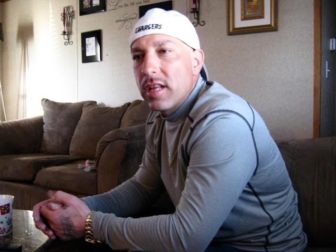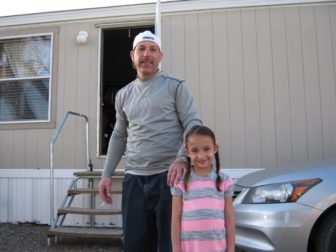 FARMINGTON—Joshua Saiz paces outside his mobile home, anxiously puffing on a cigarette and, alternately, flashing a grin at his young daughter. The gravel crunches under his shoes as he takes six short steps up, makes a tight turn, then six steps back.
FARMINGTON—Joshua Saiz paces outside his mobile home, anxiously puffing on a cigarette and, alternately, flashing a grin at his young daughter. The gravel crunches under his shoes as he takes six short steps up, makes a tight turn, then six steps back.
Always six steps up, six steps back.
The 40-year-old former oil field laborer can’t bring to mind why he’s so consistent. But his wife, Nakrista Saiz, has the answer: “I’ve asked him, too. That’s how many steps he could take in the cell.”
In 2013 and 2014, Saiz spent a year in solitary confinement at Santa Fe’s Penitentiary of New Mexico trying not to lose his mind.
“The days are just — the days are long,” Saiz said last year in an interview with NMID. “You’re just alone. You can’t see other people; all you see is a wall … My mind would race. I could see myself losing it, going crazy. I would sit there and tell myself: Hold on, don’t — I didn’t want to go crazy, I didn’t want to lose it.”
He was suffering from deep depression when he was thrown into solitary in May 2013, the result of watching his other daughter die at 23 months old of unknown causes on a camping trip before his arrest.
 Solitary, Joshua Saiz said, has made it worse. Where once there was a gregarious, chatterbox of a man, there now is an introvert who is sometimes paranoid, often lost in his own thoughts and struggling to make conversation, even with his wife and child.
Solitary, Joshua Saiz said, has made it worse. Where once there was a gregarious, chatterbox of a man, there now is an introvert who is sometimes paranoid, often lost in his own thoughts and struggling to make conversation, even with his wife and child.
“Now, my mind freezes up,” he said, more than a year after his release. “It’s like my vocabulary is gone, and I just worry. It’s like something bad is going to happen, and they’re going to send me back to prison.”
As legislators in Santa Fe debate a pair of bills that would limit the use of solitary on people living with or exhibiting signs of mental illness — including severe depression — Saiz’s experience stands as a harsh reminder of the consequences 22 hours or more a day spent alone in a cell can have on a person’s mental health.
“That’s exactly the kind of thing we’re trying to avoid,” said state Rep. Antonio “Moe” Maestas, D-Albuquerque, the sponsor of HB175.
By the third month of his time in solitary, Saiz should not even have been in prison, let alone isolated confinement, according to a civil rights lawsuit he has filed against the New Mexico Department of Corrections and some of its officials.
 Saiz had spent time in a California prison as a younger man for drug-related crimes, but had, he said, turned his life around by the late 2000s. He was working in the oil fields and raising a family when his young daughter died on the camping trip.
Saiz had spent time in a California prison as a younger man for drug-related crimes, but had, he said, turned his life around by the late 2000s. He was working in the oil fields and raising a family when his young daughter died on the camping trip.
“When she passed away, I just, I lost it, backslid, started drinking and just doing everything,” he said. “Yeah, just went crazy.”
Saiz was arrested on a burglary charge and was sentenced to probation. His addiction and depression worsened, and he was arrested again for escape from probation. This time, he was sentenced to four years prison time in May 2012. He passed his time with a clean record, according to his lawsuit, accumulating “good time” and was on track for an early release.
A year later, a fight broke out in the pod where he was housed. Another inmate was stabbed. The corrections officers did not see the fight or who did the stabbing, so they charged every inmate in the pod with the assault. According to his lawsuit, Saiz was nowhere near it.
His good time was stripped, and he was sentenced to 240 days in solitary confinement as punishment after a quick hearing. Most of his possessions were taken. His telephone access was severely limited. Corrections officers escorted him out of his cell for an hour or two a day to exercise or shower.
Saiz languished.
“Everything is minimized to the least possible,” he said. “After I don’t even know how long, I couldn’t even concentrate to read a book. I would sit there and go to read the words—I guess I was reading it—but my mind was thinking and would just go off. I wanted to have a chance to do some programs, to knock off some of my time. Or to do some counseling; something to help me out.”
None of that was allowed. So Saiz filed appeals to prison officials, hoping they would overturn his punishment. The first two were denied; the third was granted in August 2013, nearly three months after his time in solitary began. But Saiz wasn’t notified until July 2014, 10 months later. That’s when an appellate lawyer at the Public Defender’s Office noticed the error and brought it to the Correction’s Department.
Even after he was notified, Saiz said, he spent weeks in solitary before being sent to the Las Cruces Correctional Facility and, eventually, home.
The Corrections Department did not respond to requests for comment, but is fighting his lawsuit in court.
Saiz is back to work now, both in a job and in trying to repair his relationships. A year in solitary changed him, he said.
“Before he went in, you couldn’t get him to shut up,” Nakrista Saiz said. “It didn’t matter if it was the poorest guy on the streets or the richest guy, he could relate to anybody. And now, it’s really hard to get him to talk to anybody really.”
Photographs by Jeff Proctor.
Related:
Bills would limit solitary confinement, require reporting in NM